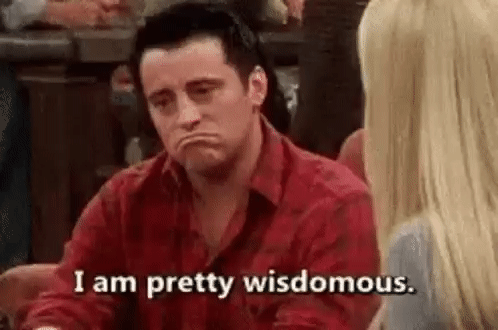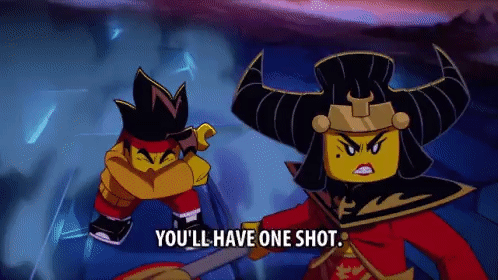Here are some collected Twitter ramblings from February 2022, with some additional color commentary sprinkled in.


If you’re given the choice, that is. Sometimes the fates conspire against you.

It’s a completely acceptable outcome to learn that your target may not be as useful as you think it is. And if you have to find that out, it’s better to find it out sooner vs. later.

Gettin’ old. Stay off my lawn, kids!


I’ve fallen completely in love with Effin’ Birds. It’s just a little too relatable working in the pharmaceutical industry. And if you’re not giving them a follow, you really ought to. It’s a lovely way to brighten an otherwise dismal day.


This is one of the scariest safety incidents I witnessed in grad school, or ever, for that matter. Other than that one time I had a bottle of bromine spill out the front of my hood. But I’ll save that story for another day!


We have swag, and it’s some mighty comfortable swag. I make no apologies.


I really appreciate all the effort that Dennis Hu puts in to make Drug Hunter a good follow. There were so many good choices for molecule of the year this year! I had a personal stake in rooting for the ER degrader ARV-471. But I think everyone kinda knew this was gonna be Paxlovid’s year. It was a great discovery story, and the human health impact is right here and now. Hats off to the Pfizer team.


The Island of Misfit Toys is about right. Academia has beome the last refuge for people with serious personal flaws, who are tolerated because of their brilliance. In industry, the tolerance for “brilliant jerks” is far, far less. Things like this happening in industry would result in multiple heads rolling. We’re not perfect, but we have pretty strict tolerances around harassment. Remind me again why people think putting up with this sh!t in academia is so desirable?



The time difference left me a bit more disengaged from the Olympics than normal, but I really enjoy the strategy that goes into a curling match. Apparently Mr. T does too!


Really excited that we’ve now claimed the first USAN name for a heterobifunctional degrader. There’s been a lot of speculation on the origin of the “bavdega” part of the name, although many have noted that the “lutamide” stem is common to non-steroidal AR antagonists like flutamide, enzalutamide, etc. If I know where “bavdega” came from, I’m not telling.


One of the great joys of my life outside of work is doing STEM outreach with Scouts. February has coalesced as “STEM month” for both my youngest son’s Cub Scout pack, and also my older boys’ Boy Scout troop. The Boy Scout troop now has a sister all-girl BSA troop that they meet with. This year, I took a big chemistry roadshow (complete with lycopodium powder fires!) to their troop meeting right around International Day of Women & Girls in Science. We still have so much work to do to get girls more engaged with science, and I was happy to do my part to ignite some interest in these middle & high school-aged kids.





Hiking is my other big passion outside of work. This was my first hike of the year when things had started to thaw a bit. My estimation of the trail condition was a bit optimistic. It turned out that the well-traveled trails at the preserve were well packed down into a sheet of ice. It took me a solid 3.5 hours to cover 6.2 miles, which is a pretty slow pace for the terrain. Still felt liberating to get outdoors again after a long winter!


Never trust a chemist who can’t cook. We have Paul Prudhomme’s cookbook, and his spicy, butter-drenched Cajun recipes have been a real boost through the winter months.


Oy. If only repeatedly thinking that we had made a certain reaction Pd-free was the biggest mistake that chemists made. Medicinal chemists repeat some of the same sins over and over. Those mistakes were a big trigger for the tweetorials on structural alerts. I’m over people continuing to publish the same crappy hit structures while living in complete ignorance of how useless they are. It’s made even worse by the fact that reviewers and editors let all of this stuff slide into journals, continuing the pollution of the med chem literature. This broad ignorance has been an inspiration for all of my various pharmacology tweetorials. I’ve felt for a long time the need to apply some course correction on this stuff. Sometimes folks just don’t know any better. The only way we get better is by continuous learning.


Medicinal chemists have a lot of things to balance. And it’s only rarely that the things that favorably influence one parameter are not unfavorable to another. It’s an endless series of tradeoffs to find that molecule that’s “good enough”. With infinite optimization time and resources, we can always make the grass greener. Knowing when what you’ve got is good enough is an art. There are always warts. It’s just down to knowing which ones won’t be fatal.


I need to do a big prune of my LinkedIn connections. I no longer connect to BD and sales folks unless I have a pre-existing professional relationship with them. Because the next thing that happens is I get a sales pitch that I don’t want. I get it. Your job is to sell me on this wonderful opportunity that I’d be only too happy to buy, if only I knew it existed. But the reality is, I’m busy doing my job and I don’t have time for random sales pitches. If I need help, I’ll seek out and ask for it. Don’t call me, I’ll call you.
Related to this, I really wish people would be specific about their job role. When I see someone label themself as “experienced problem solver and thought leader”, I’m immediately wary. I get that maybe someone doesn’t want to pigeonhole themself in a certain way, but it doesn’t leave me a lot to go on for whether or not I want to accept a connection invite from someone I don’t know. Sometimes that generic language is just code for “I’m a sales/BD person”. Just tell me what you do in an introductory message so I can make an informed decision on connecting.


Please, just don’t do this. It’s such a bad look. If I don’t know you, I can’t recommend you to anyone. Me forwarding your CV with no recommendation (which I can’t give, because I don’t know you) is no better than you just applying for the job via the website.


I really let it rip with the Scouts this year. Used some Tygon tubing to make a nice lycopodium flamethrower. No matter what else I do, the main thing the kids want from me is to set stuff on fire.


Amen.


It never feels like enough. I mean, I helped put dabrafenib on the market. I’ve tangibly helped cancer patients. I should feel good about that, and maybe on the odd day I do — a little. But I feel much more acutely how much there still is to do for cancer patients, and how I’ll only ever get to do a small portion of it before my career time is up.


This whole thread was a crusher. Automation, AI/ML, whatever the technology is. It started out with a grandiose claim that we’re knocking on the door of automating everything in organic synthesis. As anyone who does organic synthesis for a living can tell you, this notion is (currently) laughable. That isn’t to say that we haven’t made amazing progress in reaction automation, and I fully expect that progress to continue — and become increasingly useful in the business.
No, this thread came about because I (and others) are tired of proponents of these new technologies constantly overselling what the technology can do. It’s particularly true in the arenas where software and engineering are rubbing up against the blissfully chaotic business of biology. I don’t think most of these folks are malicious. Rather, coming from their engineering backgrounds, they’re ignorant of how drug discovery actually works, and how immensely difficult it is. Those of us who have been knocked around for a decade or two and taken our lumps are over it. Practitioners of these newer technologies should try being a little more humble, and honest.
Unfortunately, FOMO is driving people to make decisions and do deals, which drives a less-than-virtuous feedback loop. Extraordinary claims require extraordinary evidence. Science starts from a position of skepticism. The best approach: “Tell me about the limitations of your technology and what it can’t deliver.” Anyone who can’t level with you and promises you the moon isn’t worth your time and money. Perhaps a few more people in the leadership ranks of pharma would do well to remember that.

A follow-up to the above. My skepticism toward these technologies, and more specifically the carnival barkers who are trying to sell us on the latest whiz-bang gizmo, is separate from the fact that I really want these technologies to work in the long run. The issue is, I think the time horizon for these things becoming practically useful at eliminating the true bottlenecks in drug discovery (which are mostly in the clinic) is many years in the future. Probably long after my career is over.


This was the beginning of a bunch of career-related posting for me that stretched into March. It’s easy to believe coming out of grad school that you love the lab and want to be in the lab forever — because that’s probably all you’ve done up until that point. Things change. You get exposed to new skills, you get older, you develop different priorities in your life. I think one of the reasons people have career unhappiness is that they don’t take enough time to reflect on how what they’re doing is (or isn’t) aligned with what they want out of their careers. Taking that look at your career and yourself is hard, but it’s a key to long-term contentment.


Huge shout-out to @BlackInChem for posting two Black chemists to celebrate every day during Black History Month. I learned a lot!


Yeah, I’m not down with censorship in schools. Banning books is the surest way to fan the flames of those “dangerous ideas” that control freak school boards are so eager to clamp down on. Give kids a little more credit for their ability to process books like Maus, and then guide the discussion that follows. (I had never read it before and it was terrific btw!)


I try to avoid being too overtly political on my account, because I’m just a medicinal chemist. The invasion of Ukraine directly impacts chemistry though, in too many ways to enumerate here.


This again. It will never change until editors and reviewers stop looking the other way, because they want people to look the other way at the questionable stuff in their own papers. As much as we want science to be above that human fray, we’re not. We’re human.



